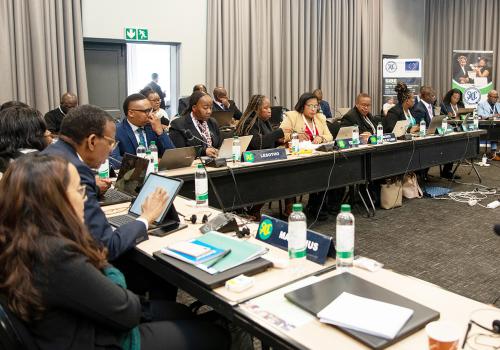The Secretariat of the Southern African Development Community (SADC) under the SADC Industrialisation and Women Economic Empowerment Project (IWEE), and in partnership with GIZ through the Cooperation for the Enhancement of SADC Regional Integration Programme (CESARE), hosted a regional dialogue on Gender and Financial Inclusion on the 14th of June 2023.
The Dialogue was held on the sidelines of the SADC Financial Inclusion Sub-Committee meeting in Johannesburg, South Africa under the theme: ‘Making the economic empowerment of women matter’, to create awareness on the financial inclusion of women and the challenges that women entrepreneurs experience when building and growing their businesses.
The Dialogue was convened in recognition of the challenges women in the SADC region face in accessing financial services across the different economic sectors, a situation which limits their ability to benefit from the SADC Industrialisation Strategy and related opportunities.
In facilitating the Dialogue, Ms. Kelly Dambuza highlighted the importance of taking into cognizance the barriers that exist for women in the economic space, noting that women face different weights and barriers compared to their male counterparts. Ms. Dambuza said, by recognising and eliminating gender inequalities, as recommended in the SADC Protocol on Gender and Development, there is great potential for women to act as a powerful resource for development in the SADC region and support an inclusive industrialisation approach.
The Deputy Head of the Corporation at the German Embassy in Pretoria, Ms. Elke Wolff, indicated that gender equality and women’s empowerment is one of the four priorities for the German Government, hence the support to address gender-based violence and women’s economic empowerment in the SADC region. On this note, Ms Wolff emphasised that feminist development policy is key towards the elimination of structural inequalities, unequal treatment and discrimination.
In her keynote address, Ms. Shiphra Chisna from the Graça Machel Trust, emphasised that access to capital continues to be the number one barrier faced by African Women Small and Medium Business Enterprises and underscored the importance of understanding the 3 dimensions of financial inclusion which are: Access, Usage and Quality, which entails availability and appropriateness of financial products and services, the frequency of interaction with the product or service, and the combination of product fit, value add, and convenience. Ms. Chisna highlighted that finance is a powerful tool for addressing inequalities rooted in the gender-environment nexus, highlighting that financial inclusion is necessary to ensure that economic growth performance is inclusive and sustained by ensuring availability, accessibility and affordability of formal financial services to all segments of the population.
Ms Chisna further highlighted that women’s financial inclusion has been an underused source of growth and that, if fully utilised, it can spur inclusive development. She further shared work done by the Graça Machel Trust in advancing women economic empowerment and highlighted that the Trust’s Women’s Economic and Social Advancement programme aims to accelerate the economic advancement of African women by strengthening existing country-level business women’s associations; building networks of women in sectors that are critical for Africa’s growth; increasing women’s access to finance and financial services as well as strengthening women-owned and led businesses to grow.
The Zimbabwe Reserve Bank and the Ministry of Finance and Planning of the United Republic of Tanzania shared best practices from their respective countries on women’s financial inclusion initiatives. The Zimbabwe experience centered on implementation of the National Financial Inclusion Strategy with a targeted focus on those left-behind and the establishment of Zimbabwe’s Women’s Microfinance Bank. One lesson from Zimbabwe was that women are not a homogenous group and therefore pensioners and the elderly were provided for. that. The United Republic of Tanzania, on the other hand, shared their experience on promoting affordable products for women. Both countries emphasized the need for a coordinated approach towards financial inclusion.
In closing the Dialogue session, the Director of Finance, Investment and Customs at the SADC Secretariat, Mr Sadwick Mtonakhuta, highlighted the need for capacity building and the importance of coordinated efforts to achieve financial inclusion for sustainable economic growth of the SADC region.
In most parts of the SADC region, women are at a disadvantage due to their exclusion from value chains and their limited capacity to take advantage of productive opportunities. Ensuring women’s access to productive resources, employment, and economic empowerment, requires specific and focused attention on reviewing current economic approaches, laws, and regulations and allocating budgetary resources for the education, training, skills, and entrepreneurial development of women.
As part of the regional drive to promote women’s economic empowerment and gender-responsive development, the SADC established the Regional Multi-Dimensional Women Economic Empowerment Programme 2020-2030 (RMD-WEEP) which, among others, highlights the need to support Member States with innovative ideas, guidelines, and priorities for increasing women’s access to, and use of, productive resources, including access to finance. The Dialogue was attended by over 87 participants from Ministries of Finance and Gender, Central Banks and regional partner organizations and stakeholders.

